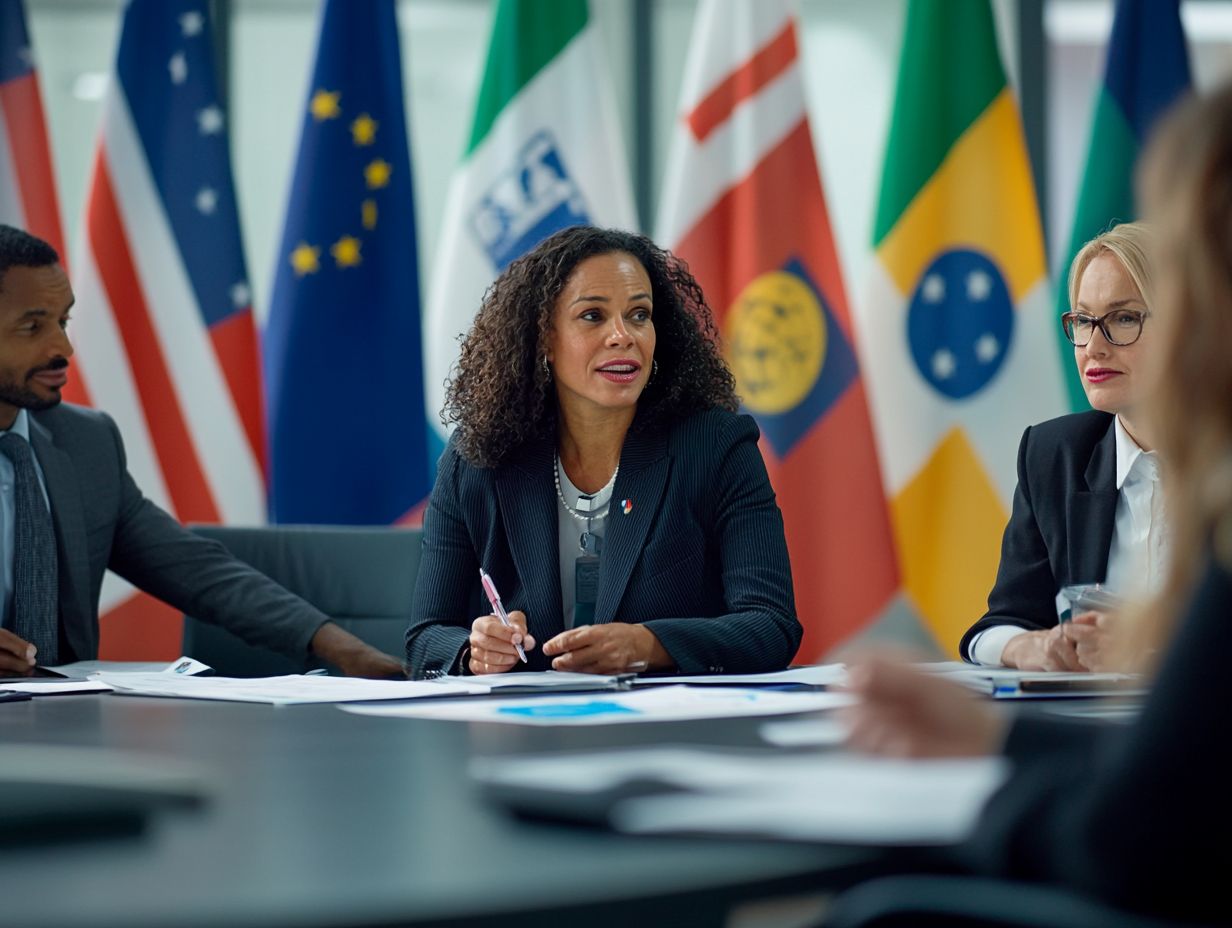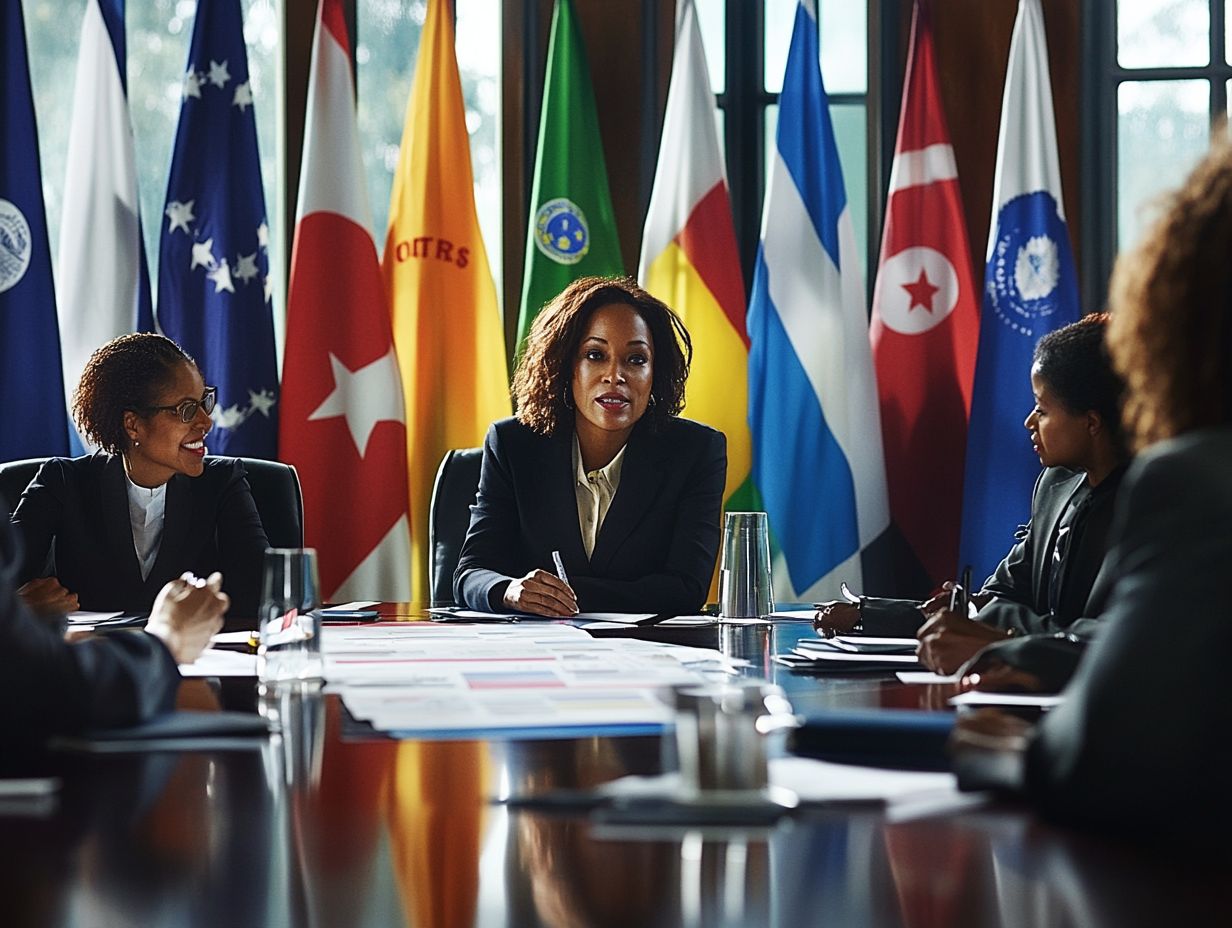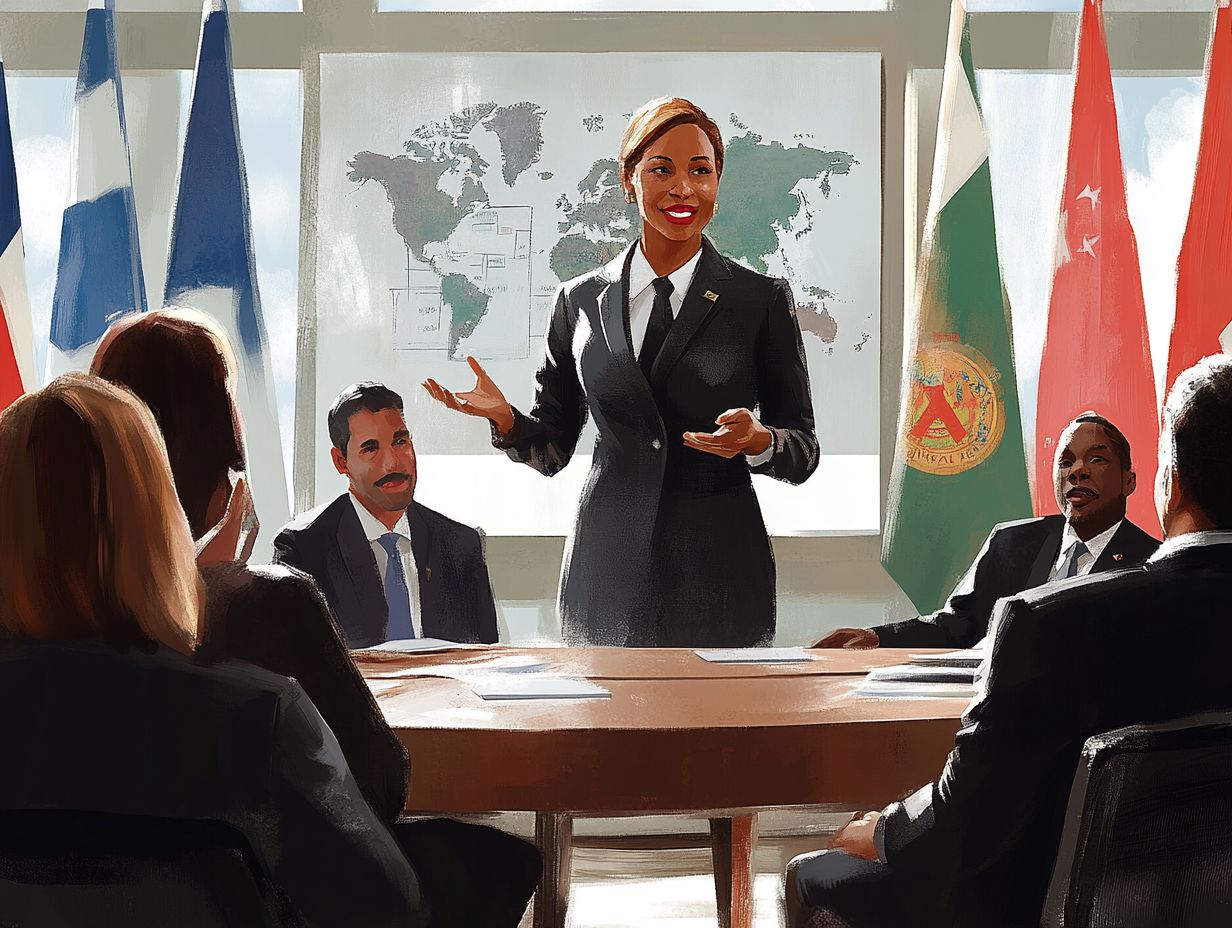Understanding the Role of the Secretary of State
The Secretary of State holds an important position in shaping both domestic and foreign policies, serving as a vital advisor to the President.
This overview delves into the role, outlining its responsibilities and the historical evolution that has refined it over time. You ll discover the selection process, the powers and duties tied to the position, and the intricate relationships it maintains with other government officials.
It also addresses notable controversies and criticisms that have emerged throughout its history, revealing their impact on the office. Whether you’re eager to understand the Secretary’s influence in diplomacy or unravel the complexities of their role in domestic affairs, this exploration will reveal the crucial impact of this role.
Contents
- Key Takeaways:
- Overview of the Secretary of State
- History of the Position
- Selection and Appointment Process
- Powers and Duties of the Secretary of State
- Relationship with Other Government Officials
- Controversies and Criticisms
- Frequently Asked Questions
- What is the role of the Secretary of State?
- What are the specific duties of the Secretary of State?
- Who is currently serving as the Secretary of State?
- What qualifications are required to become the Secretary of State?
- How does the Secretary of State work with other government officials?
- Is the Secretary of State involved in domestic affairs as well?
Key Takeaways:

- The Secretary of State is a key government official responsible for managing foreign relations and domestic affairs, and is nominated and confirmed by the President.
- The position of Secretary of State has evolved over time, with an increasing emphasis on diplomatic and administrative duties, rather than purely foreign relations.
- The Secretary of State works closely with other government officials, collaborating and communicating to ensure effective management of both foreign and domestic affairs.
Overview of the Secretary of State
The U.S. Secretary of State holds an important role within the President s Cabinet, responsible for managing the Department of State. This important position serves as the President s diplomatic representative in international conferences and discussions, significantly influencing foreign policy decisions that impact economic relationships and national security.
The Secretary advises the President on various international crises, ensuring that the United States sustains its standing and influence on the global stage.
Definition and Responsibilities
The Secretary of State serves as the head of the Department of State, carrying out the President s foreign policy.
In this crucial position, the Secretary directly engages in international treaties and diplomatic negotiations, working diligently to promote stability and fortify alliances. This role also requires serving as the primary spokesperson for foreign policy, clearly articulating the administration’s perspective to both domestic and global audiences.
The Secretary also oversees various responsibilities within the Department, ensuring effective coordination of resources among U.S. embassies and consulates around the world. By collaborating with other government officials and international leaders, the Secretary plays a key role in nurturing relationships that enhance national security and advance economic interests.
History of the Position
The role of Secretary of State has undergone a remarkable evolution since its inception, deeply rooted in the U.S. Constitution and mirroring the nation s shifting perspective on foreign affairs and diplomacy.
Initially centered on fundamental communication and correspondence, the position has expanded to include a diverse array of responsibilities, such as international negotiations, economic relationships, and crisis management.
By grasping the historical context, you gain valuable insight into how the Secretary of State’s role has adapted over time, effectively addressing the complexities of both domestic and international challenges.
Evolution of the Role
Over the years, the role of the Secretary of State has evolved significantly. It has shifted from a primary focus on communication to a dynamic position that actively influences U.S. foreign policy.
This transformation has been shaped by pivotal historical events, such as the signing of the Treaty of Paris in 1783, which marked the United States’ debut on the global stage. The influence of prominent figures like Henry Kissinger is profound; his smart negotiation during the Cold War fundamentally redefined relationships with both allies and adversaries.
As the world grapples with the complexities of globalization and international conflicts, the responsibilities of this crucial office have expanded considerably. Today, engaging with multinational organizations groups made up of many countries working together and addressing global challenges, such as climate change and biosecurity, are essential facets of the role. This reflects its critical importance in contemporary diplomacy.
Selection and Appointment Process

The selection and appointment process for the U.S. Secretary of State is a careful process that begins with a nomination by the President. This is followed by a confirmation process that requires the approval of the Senate, underscoring the importance of the role within the cabinet.
This rigorous process guarantees thorough vetting of candidates, as they are tasked with shaping foreign policy and managing diplomatic relationships on behalf of the United States.
Nomination and Confirmation
The nomination of the Secretary of State is a pivotal moment in the appointment process. The President must choose a candidate who aligns with their foreign policy vision and legislative priorities.
This appointment carries substantial political significance, impacting international relations and diplomatic strategies. The Senate evaluates nominees, playing a vital role in shaping foreign policy by conducting hearings to assess the nominee’s qualifications and readiness to represent the nation.
During these hearings, senators delve into the candidate s past actions and statements. This significantly shapes how the public views our foreign policy. Public opinion wields considerable power, swaying senators to either champion or oppose the nomination, ultimately reflecting their constituents’ interests regarding future foreign engagements and diplomatic initiatives.
Powers and Duties of the Secretary of State
The Secretary of State holds immense power and responsibility in both foreign relations and domestic affairs. You serve as the chief diplomatic representative of the United States, overseeing the operations of the Department of State.
This role involves managing diplomatic relationships, directing foreign aid, and providing critical guidance on international treaties and agreements. You also handle domestic administrative duties that support the broader mission of U.S. foreign policy, ensuring a cohesive approach to the nation’s interests both at home and abroad.
Foreign Relations and Diplomacy
The Secretary of State holds a crucial position in managing foreign relations and diplomacy, effectively becoming the face of U.S. engagement on the global stage.
Through strategic negotiations and coalition-building, this key figure navigates international crises with both tact and foresight. By fostering dialogue and collaboration with allies and partners, they work diligently to strengthen economic relationships that ultimately enhance global stability.
Whether addressing urgent matters like climate change, security threats, or trade agreements, their ability to represent U.S. interests in global discussions is paramount. Utilizing a range of diplomatic tools, they ensure that America’s values and priorities resonate in multilateral forums, promoting a more cooperative international landscape.
Domestic Affairs and Administrative Duties
Along with overseeing foreign relations, the Secretary of State has critical responsibilities regarding domestic affairs. This ensures the seamless operation of the Department of State.
This role encompasses a variety of administrative duties essential for the department’s effective functioning. Managing personnel is key. This involves recruiting, training, and retaining talented staff who can navigate the complexities of both domestic and international issues.
Budget oversight is equally vital. Resources must be allocated efficiently to align with strategic priorities. Coordination with other agencies is crucial as well. This facilitates collaborative efforts in areas like national security and economic policy to promote smooth intergovernmental relations.
Relationship with Other Government Officials

The relationship between the Secretary of State and other government officials, especially cabinet members, is crucial for achieving effective governance and executing foreign policy.
This dynamic shapes decision-making and ensures that strategies are aligned for optimal impact on the global stage.
Collaboration and Communication
Effective collaboration and communication between the Secretary of State and cabinet members are vital for unified foreign policy objectives. This synergy deepens understanding of international dynamics and ensures departments like Defense and Treasury align their efforts toward shared goals.
By implementing clear communication strategies, challenges can be tackled head-on. It’s essential to adapt swiftly to the ever-changing geopolitical landscape.
Utilizing tools such as meetings between departments, secure messaging platforms, and collaborative technologies allows for sharing insights and synchronizing strategic approaches.
Maintaining open lines of communication is essential to reinforce a collective vision and ensure coherent action on the global stage.
Controversies and Criticisms
Throughout history, the position of Secretary of State has encountered numerous controversies and criticisms, especially regarding decisions made in foreign policy and international affairs.
Examples and Impact
Several controversies involving the Secretary of State have notably influenced foreign policy decisions and international crises.
Take, for instance, the backlash surrounding the withdrawal from the Paris Agreement. This decision raised eyebrows about the United States’ commitment to addressing climate change. There’s also the matter of diplomatic ties with North Korea, particularly regarding denuclearization talks. This situation has prompted questions about the effectiveness and transparency of U.S. strategies!
These incidents have shaped global perceptions of American leadership. They emphasize the Secretary of State’s essential role in balancing national interests with international expectations. Such controversies illustrate the intricate web of diplomacy, where every choice impacts bilateral relationships and the wider geopolitical landscape.
Frequently Asked Questions
What is the role of the Secretary of State?

The Secretary of State is a high-ranking government official responsible for overseeing foreign affairs, diplomacy, and international relations. They serve as the chief diplomat and advisor to the President on foreign policy matters.
What are the specific duties of the Secretary of State?
- Managing and supervising the Department of State.
- Representing the United States in diplomatic negotiations.
- Implementing foreign policy initiatives.
- Overseeing the issuance of passports and visas.
- Promoting democracy and human rights.
- Acting as the official channel of communication between the United States and other countries.
Stay informed on the role of the Secretary of State!
Who is currently serving as the Secretary of State?
Right now, Antony Blinken serves as the Secretary of State under President Joe Biden. He was confirmed by the Senate on January 26, 2021, and took office two days later.
What qualifications are required to become the Secretary of State?
The Secretary of State is often a seasoned expert in foreign policy and diplomacy. The President picks them, and the Senate must approve the choice.
How does the Secretary of State work with other government officials?
The Secretary of State collaborates closely with the President and other officials to shape foreign policy. They also engage with diplomats and ambassadors to represent the U.S. internationally.
Is the Secretary of State involved in domestic affairs as well?
The Secretary of State focuses on foreign policy but also addresses essential domestic issues like immigration and trade. Their primary mission is to represent the U.S. on the global stage.





